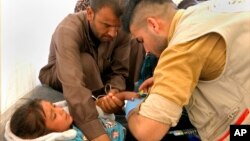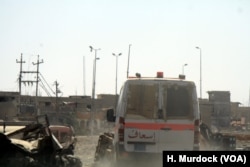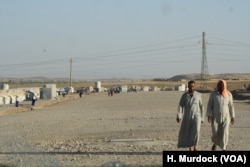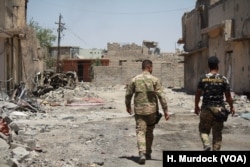The International Organization for Migration reported 752 Iraqis were sickened, 312 hospitalized and at least two people, a child and a woman, died from a massive case of food poisoning in a camp for Internally Displaced People outside the beleaguered city of Mosul.
“We understand that this was a contractor that had brought food to the camp around 4:00 p.m. to break the daily Ramadan fast, which was to be served at 7:30," Monday, said Joel Millman, a spokesman for the International Organization for Migration. "We understand the authorities are investigating where the contamination came from and whether it happened as a result of those hours between the arrival and the serving or something else.”
After the meal was served, camp residents say, so many people fell ill authorities ran out of ambulances and transported people by bus to hospitals, which filled to capacity.
“It was a disaster,” said Salah Khalaf, resting in a small patch of shade by her tent with her six children. A month and a half before, the family fled Mosul under heavy fire as Iraqi forces battled Islamic State militants for her neighborhood.
“The only reason we didn’t get sick is because we didn’t get food that day,” she added.
As the sun faded over the Hassan Sham camp Tuesday evening it was still at least 38 degrees Celsius (100 F) and some residents said they continued to feel ill after being released from the hospital.
“Maybe the heat made us get sick again,” said Ahmed Heshab, a 23-year-old father of two. “We had diarrhea, vomiting and sharp stomach pains.
The U.N. refugee agency reports the outbreak of food poisoning occurred in U2 camp, which houses 6,300 displaced people from Mosul.
“Staff have been working closely overnight to coordinate the response with other agencies and authorities in the Kurdistan region of Iraq and Baghdad to ensure that those who have fallen ill were able to receive swift medical treatment," said UNHCR spokesman Andre Mahecic, "and that the seriously sick are provided with transport to the nearby hospitals.”
It was tragic this incident has happened to people who already have gone through so much suffering, he added.
Mahecic said more water has been provided at the camp and additional health agencies were brought in to help with the humanitarian response. He said aid agencies are waiting for the results of the investigation to learn what to do to prevent such a situation from occurring again.
Sickened families, however, said that task could prove difficult as they cannot even figure out which food items were contaminated.
IOM spokesman Millman said the menu included rice, yogurt, chicken and soup. He says a non-governmental agency based in Qatar had contracted a local restaurant to provide the Iftar meal for that evening.
“Some just ate the rice and got sick,” said Heshab, as a crowd gathered, saying there is never enough health care available at the camp. “Others just ate the chicken or the yogurt and got sick.”








